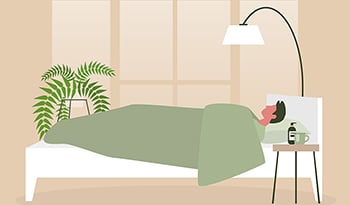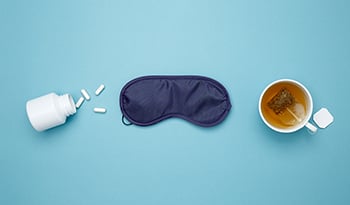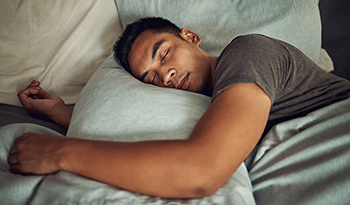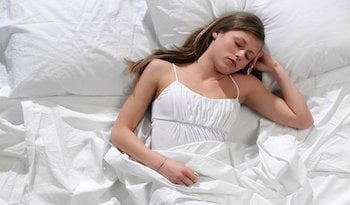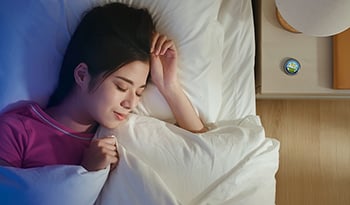The Best Natural Supplements
Uyku belki de en az anlaşılan vücut süreçlerinden biridir, ancak ruh halimiz, enerji seviyemiz ve uygun beyin fonksiyonumuz için değeri hepimiz tarafından takdir edilmektedir. Şüphesiz, uyku hem beden hem de zihin için kesinlikle gereklidir.
Kronik uyku eksikliği veya değişen uyku düzenleri veya uyku yoksunluğu zihinsel ve fiziksel işlevi önemli ölçüde bozar. Sonuç olarak, birçok sağlık durumu, özellikle depresyon, kronik yorgunluk sendromu ve fibromiyalji, tamamen veya kısmen uyku bozukluğu ile ilişkilidir.
Uykunun tüm faydaları hala bir sır olsa da, uyku şüphesiz hücrelerimizdeki enerjiyi yeniden şarj eder ve zararlı kimyasalların vücuttan (özellikle beyinden) uygun şekilde uzaklaştırılması için de gereklidir. Yeterli derin uyku da optimal bağışıklık fonksiyonu için kesinlikle kritik öneme sahiptir.
Uyku için en iyi takviyeleri önermeden önce, normal uyku ve derin uyku ve rüya görmenin önemi hakkında bilgi edinmek önemlidir.
Uyku Aşamaları
Göz hareketi ve beyin dalgası izlerine (elektroensefalografik [EEG] kayıtları) bağlı olarak uyku, REM (hızlı göz hareketi) uyku ve REM olmayan uyku olmak üzere iki farklı türe ayrılır.
REM uykusu sırasında gözler hızla hareket eder ve rüya görme gerçekleşir. REM uykusunda rüya görmek ve yeterli zaman geçirmek uyku kalitesinin önemli bir parçasıdır. Uyku kalitesini belirleyen bir diğer faktör, REM dışı uykunun en derin aşamalarında harcanan zamandır. Bu uyku türü, azalmış beyin dalgası aktivitesi ile ilişkilidir ve beyin dalgası aktivitesi seviyesine ve uyarılma kolaylığına göre 1 ila 4 numaralı dört aşamaya ayrılır.
Aşama 1 uyku başladığında gerçekleşir. Hafif bir uykudur. REM dışı uyku, daha düşük beyin dalgası aktivitesi ile karakterize olmasına rağmen daha derin uyku seviyelerine ilerledikçe, hücresel onarım mekanizmalarının, detoksifikasyonun ve bağışıklık fonksiyonunun artan aktivitesi ile de bağlantılıdır. REM dışı uykunun en derin seviyesi 4. aşamadır. Bu en derin uyku seviyesi sırasında bağışıklık sistemi, onarım mekanizmaları ve hücresel enerji üretimi en yüksek verimlilikte çalışır. Kaliteli uyku, hücrelerimizin enerji üreten bölmeleri olan mitokondri tarafından üretilen yakıt olan ATP üretimini arttırır. Uyku, hücreleri yaşamı yönlendiren enerji para birimi olan ATP açısından zengin yapar.
Uyku Dinamik Bir Durumdur
Uyku statik bir süreç değildir, art arda yaklaşık 90 dakikalık döngülerde gerçekleşen çok fazla aktivite vardır. Uyku döngüsü, 1. evre REM olmayan uyku ile başlar, 2. ve 3. aşamalardan 4. evre REM olmayan uykuya kadar ilerlemelidir ve daha sonra bazı nedenlerden dolayı beyin aniden çok daha aktif hale gelir ve REM uykusunu tetikler. Yetişkinlerde, ilk REM uyku döngüsü yaklaşık 5 ila 10 dakika sürer. Bu rüyaları nadiren hatırlıyoruz, çünkü REM aktivitesinin dalgalanmasından sonra beyin dalgası kalıpları 90 dakikalık bir uyku döngüsü için REM dışı uykununkilere geri döner. Sonraki her döngüde, REM uykusunda harcanan süre artar. Her gece çoğu yetişkin beş veya daha fazla uyku döngüsü yaşar (veya toplam 7,5 ila 9 saat uyku süresi). Son uyku döngüsü (kişiye bağlı olarak beşinci veya altıncı), yaklaşık bir saat sürebilen bir REM uyku süresi üretebilir.
Uyku Kalitesi vs. Uyku Süresi
Genellikle insanlar uyku süresini uyku kalitesinin temel göstergesi olarak eşitler. Kendi başına, değil. Toplam uyku süresi, uyku yoksunluğunun zararlı etkilerinden kaçınmak için uyku kalitesine harcanan zaman kadar önemli değildir. Birçok kişi tarafından belirtilen standart uyku kalitesi kriterleri şu göstergelere dayanmaktadır:
- 30 dakika veya daha kısa sürede uykuya dalmak.
- Gecede bir kereden fazla uyanmamak.
- Başlangıçta uykuya daldıktan sonra 20 dakika veya daha uzun süre uyanık olmak.
Bununla birlikte, bu göstergeler önemli olsa da, uyku kalitesinin daha büyük bir göstergesi olan, REM dışı uykunun daha derin aşamalarında harcanan zamandır yeterli REM uykusu ile birleşir. İnsanlar 40'lı yaşların ortalarından elli yaşına kadar geldiklerinde, gece uyanmalarının artmasına neden olabilecek bir dizi sağlık sorununa ek olarak (örneğin, uyku apnesi, diyabet, kadınlarda menopoz sıcak basması, erkeklerde prostat büyümesi vb.), REM'de bir düşüş vardır ve REM olmayan uykudan REM uykusuna geçişte uyanma eğilimindedirler. Sonuç olarak, derin uyku evrelerinde 3 ve 4 harcanan zaman azalır. Bu değişiklikler 45 yaşın üzerindeki birçok insanın düşük uyku kalitesi ve düşük enerji seviyeleri ile uğraşmasına neden olabilir.
Uyku Hapları ile İlgili Sorun
Uyku hapları (sedatif-hipnotik ilaçlar) toplam uyku süresini arttırırken ve gece uyanmalarını azaltabilirken, normal uyku mimarisini bozar. Spesifik olarak, birçoğu REM olmayan uykunun yanı sıra REM uykusunun daha derin aşamalarına (3 ve 4) ulaşma yeteneğini önemli ölçüde bozar. Bu etki uzun zamandır bilinmektedir ve bu ilaçların genellikle sabah “akşamdan kalma” hissi vermesinin ana nedenidir. Buna karşılık, birkaç doğal uyku arttırıcı (örneğin, melatonin, 5-HTP, GABA, L-theanine, vb.) Beynin ve vücudun tamamen şarj olmasına izin veren REM dışı uykunun daha derin seviyelerinde harcanan zamanı arttırdığı görülmektedir.
Hem reçeteli hem de reçetesiz satılan ilaçlar önemli risklerle ilişkilidir. Reçeteli ilaçlar oldukça bağımlılık yapar ve baş dönmesi, uyuşukluk ve bozulmuş koordinasyon gibi yan etkiler üretir. Bu yüzden bu ilaçları kullanırken araba kullanmamalısınız. Ve alkol bu yan etkilerle ateşe yakıt ekler.
Hem reçeteli hem de reçetesiz satılan yatıştırıcı ilaçların en ciddi yan etkileri, kısa vadede hafıza ve davranış üzerindeki etkileri ve uzun vadede depresyon, bilişsel gerileme ve erken ölüm riskinin artmasıyla ilgilidir.1 Erken ölüm riskinin artmasıyla olan bağlantı özellikle endişe vericidir. Aralık 2020 itibariyle, 24'ten fazla nüfus temelli çalışma bu bağlantıyı göstermiştir. Uyku hapı kullanımının sadece stres, kaygı, uykusuzluk ve depresyonun bir göstergesi olduğu anlamına gelebilir. Tüm bu faktörler aynı zamanda erken ölüm riskinin artmasıyla da ilişkilidir.
Uyku ve Bağışıklık Sistemi
Bugünlerde bağışıklık fonksiyonuna çok fazla odaklanıldığında, uykunun bağışıklık fonksiyonunu geliştirmede oynadığı kritik rolü tanımak önemlidir. Uyku, bağışıklık aktivitesinin tüm yönlerini iyileştirir.2 Bu faydanın çoğu, artan enerji üretiminin bir sonucu olarak beyaz kan hücresi fonksiyonlarındaki iyileşmelerin sonucudur. Uyku (ve meditasyon) sırasında diyafragmatik solunumun geliştiğini ve kelimenin tam anlamıyla lenfatik sistemi pompalayan şeyin bu olduğunu unutmayın. Sonuç olarak, beyaz kan hücreleri harekete geçirilir ve virüslerin, mayaların ve toksinlerin filtrelenmesi ve temizlenmesi iyileştirilir.
Uyku Kalitesi Doğal Olarak Nasıl Artırılır
Kafeini Ortadan Kaldır
Diğer sağlık koşulları gibi, uyku kalitesini iyileştirmenin en etkili yolları, uykuyu bozan faktörleri tanımlamaya ve ele almaya dayanır. Birçok insanda uyku kalitesini iyileştirmenin ilk adımlarından biri kafeini ortadan kaldırmaktır. Çoğu ülkede ortalama bir insan günde 150 ila 225 mg kafein veya kabaca bir ila iki fincan kahvede kafein miktarını tüketir. Çoğu insan bu miktarda kafeini kaldırabilse de, insanların kafeini parçalama hızında büyük bir -15 kat- değişiklik vardır. Kafeini parçalayan enzimlerdeki genetik varyasyonlar, bazı insanların neden hızlı bir şekilde ortadan kaldırabildiğini açıklarken, diğerlerinin kafeini tek bir fincan kahveden tamamen ortadan kaldırması 12 ila 24 saat kadar sürer. Uyumakta zorluk çeken herkes, yedi ila on gün boyunca kafeinden kaçınmayı denemelidir. Bu kaçınmanın katı olması gerekir, bu nedenle sadece kahve değil, çay, çikolata, kafeinli ilaçlar, enerji içecekleri vb. Tüm kaynaklardan kaçınılmalıdır.
Alkol alımını en aza indirin
Uyku kalitesi ile mücadele eden kişilerde alkol de ortadan kaldırılmalıdır. Alkol adrenalin salınımına neden olur ve serotonin üretimini bozar (uykuyu başlatan önemli bir beyin kimyasalı). Uyarıcı olarak kabul edilmese de, şeker ve rafine karbonhidratlar uykuyu engelleyebilir. Şeker ve rafine karbonhidrat içeriği yüksek bir diyet yemek ve düzensiz yemek, vücutta dövüş veya uçuş tepkisini tetikleyen ve uyanıklığa neden olan bir reaksiyona neden olabilir.
Şeker Tüketimini Azaltın
Şeker tüketimini azaltmak da önemlidir, özellikle bir kişinin uyuyabildiği, ancak 3, 4 veya 5 saat sonra uyuduğu ve uykuya geri dönmekte gerçekten zorlandığı uyku sürdürme uykusuzluğunda önemlidir. Çoğu durumda, uyku bakımı uykusuzluğu hatalı kan şekeri kontrolünün sonucudur. Temel olarak, bu insanlar gece gündüz bir “kan şekeri rollercoaster” üzerindedirler. Karbonhidrat oranı düşük, özellikle şeker ve kan şekeri seviyesini hızla yükselten yiyecekler yemek gerçekten yardımcı olabilir. PGXalındığında, devrim niteliğinde bir diyet lifi matrisi de çok önemli bir husustur. PGX, yemek sonrası kan şekeri seviyelerini düşürür ve kan şekeri hız trenini ortadan kaldırmaya yardımcı olur.3 Kan şekeri izlemedeki yeni teknikler, kan şekeri seviyelerindeki gece dalgalanmalarının uyku sürdürme uykusuzluğunun ana nedeni olduğunu göstermektedir. Yemeklerden önce 2.5 ila 5 g PGX alın.
Stres Seviyelerini Yönetin
Uykusuzluğun diğer yaygın nedenleri stres, depresyon, anksiyete ve bazı ilaçlardır. Aslında, normal uykuyu engelleyebilecek 300'den fazla ilaç vardır. Ek olarak, yukarıda belirtildiği gibi, kadınlarda menopozal sıcak basmaları ve erkeklerde genişlemiş prostat gibi bazı sağlık sorunları rahatsız edici uyku ile bağlantılıdır. Neyse ki, bu zorlukları desteklemek için güvenli ve etkili doğal yaklaşımlar vardır ve bunu yapmak kesinlikle uyku kalitesini artırabilir. Unutmayın, düşük uyku kalitesinin nedeninin ortadan kaldırılması açık ara en iyi tedavidir.
Uyku için En İyi Diyet Takviyeleri
Pek çok etkili doğal uyku yardımı vardır, ancak bunlar gerçekten öne çıkan takviyelerdir:
Melatonin
Melatonin açık ara en popüler doğal uyku yardımcısıdır. Melatoninin hem çocuklarda hem de yetişkinlerde uykuyu teşvik etmede ve sürdürmede çok etkili olduğu gösterilmiştir. Melatonin seviyeleri düşük olduğunda uykunun iyileştirilmesinde en belirgindir. Melatonin takviyesi, bu yaş grubunda düşük melatonin seviyelerinin bulunması daha yaygın olduğundan, 40 yaş ve üstü kişilerde uyku kalitesini iyileştirmede en yararlı görünmektedir.4,5
Yatmadan önce 3 ila 5 mg'lık bir doz yetişkinler için fazlasıyla yeterlidir. 6 yaş ve üstü çocuklar 1 ila 3 mg'lık bir dozaj aralığı almalıdır. Melatoninin önerilen dozlarda ciddi bir yan etkisi olmadığı görülse de, melatonin takviyesi önerilen miktarlardan fazla alındığında hormon salgılanmasındaki normal sirkadiyen ritmi bozabilir. Bu nedenle, daha yüksek dozajlar almaya özel bir ihtiyaç olmadıkça, önerilen doza bağlı kalın.
Metilkobalamin (B12 Vitamini)
B12 vitamini aktif formu olan metilkobalamin, melatonini özellikle 40 yaşın üzerindeki kişilerde ve vardiyalı çalışanlarda daha etkili hale getirebilir. Metilkobalaminin uyku-uyanıklık bozukluğu olarak adlandırılan durumdan muzdarip bazı insanlara yardımcı olduğu gösterilmiştir. Bu bozukluk aşırı gündüz uykuluğu, huzursuz geceler ve sık gece uyanmaları ile karakterizedir. Vardiyalı işçilerde ve yaşlılarda çok yaygındır. Uyku-uyanıklık bozukluğu olan kişilerde, metilkobalamin almak genellikle uyku kalitesinin iyileşmesine, gündüz uyanıklığının ve konsantrasyonunun artmasına ve ruh halinin iyileşmesine yol açmıştır.6,7 Faydanın çoğu, metilkobalaminin gündüz melatonin salgısını azaltan ve gece melatonin salgılanmasına zemin hazırlamaya yardımcı olmasının bir sonucu gibi görünmektedir. Önerilen dozaj, ortaya çıktığında 3 ila 5 mg metilkobalamindir.
Magnezyum
Magnezyum sakinleştirici bir etki yaratır, stresi azaltır ve genel rahatlama ve dinlendirici uykuyu destekler. Magnezyum takviyesi özellikle yaşlılarda uykuyu iyileştirmede ve beyin dalgası izlerinde ve beyin kimyasında yaşa bağlı değişiklikleri tersine çevirmede önemlidir.8,9 Önerilen doz yatmadan önce 250 ila 300 mg'dır. Toz içecek karışımlarındaki magnezyum sitrat, malat veya bisglisinat, tabletlere veya kapsüllere karşı bu dozaj seviyesinde mükemmel bir seçimdir.
5-HTP (5-Hidroksitriptofan)
5-HTP beyinde uykunun önemli bir başlatıcısı olan serotonine dönüştürülür. Serotonine l-triptofandan bir adım daha yakındır ve uykuyu teşvik etme ve sürdürmede daha tutarlı sonuçlar göstermiştir.10,11 5-HTP'nin temel faydalarından biri, toplam uyku süresini uzatmadan derin uyku evrelerini 3 ve 4 arttırırken REM uykusunu (tipik olarak yaklaşık% 25) artırma yeteneğidir. Artışları telafi etmek için azaltılan uyku evreleri REM dışı aşamalar 1 ve 2 - en az önemli aşamalardır. 5-HTP'nin uykuyu teşvik eden etkilerinden yararlanmak için dozaj önerisi, emekli olmadan 30 ila 45 dakika önce 50 ila 150 mg'dır, ancak aynı zamanda yemeklerden önce günde üç kez 50 ila 100 mg dozunda 5-HTP'nin alınması, ruh halini yükseltici veya kilo vermeyi teşvik eden etkileri isteniyorsa önemli bir husustur. Artırmadan önce en az 3 gün daha düşük dozla başlayın.
L-Teanin
L-theanine neredeyse sadece çayda (Camellia sinensis) bulunan benzersiz bir amino asittir. Klinik çalışmalar L-theaninin stresi azalttığını, uyku kalitesini iyileştirdiğini, adet öncesi sendromun semptomlarını azalttığını, zihinsel keskinliği artırdığını ve kafeinin olumsuz yan etkilerini azalttığını göstermiştir.12 L-theanine, yatmadan önce 200 mg'lık bir dozda çocuklar için harika bir husustur. Yetişkinlerde, 200 mg'lık tipik dozajlarda L-theanine yatıştırıcı olarak hareket etmez, ancak uyku kalitesini önemli ölçüde artırır. Bu dozajda uykuyu iyileştirmenin nazik bir yolu olarak kullanılabilir. Yetişkinlerde yatıştırıcı bir etki için, daha yüksek bir tek doz 600 mg L-theanin gereklidir.
Kediotu
Bitkisel ilaç açısından, kediotu (Valeriana officinalis) en popüler ve iyi çalışılmış uyku yardımcısı olduğuna şüphe yoktur. Ayrıntılı klinik çalışmalar kediotunun uyku kalitesini iyileştirdiğini, uyumak için gereken süreyi azalttığını ve gece boyunca dinlendirici bir uykuyu teşvik ettiğini göstermiştir.13 Hepsi sabahları “akşamdan kalma hissi” yaratmadan.
Hafif bir yatıştırıcı olarak, emekli olmadan otuz ila kırk beş dakika önce 150 ila 300 mg dozunda kediotu özü (%0.8 valerik asit) alın. Sabah uykuluğu meydana gelirse, dozu azaltın. Dozaj etkili değilse, dozu arttırmadan önce kafein ve alkol gibi uykuyu bozan faktörleri ortadan kaldırdığınızdan emin olun.
Referanslar:
- Kripke DF. Hipnotik ilaç mortalite, enfeksiyon, depresyon ve kanser riskleri: ancak fayda eksikliği. F1000Res. 2016 Mayıs 19; 5:918
- Besedovsky L, Lange T, Born J. Uyku ve bağışıklık fonksiyonu. Pflugers Kemeri. 2012 Ocak; 463 (1): 121-37. doi: 10.1007/s00424-011-1044-0. Epub 2011 Kasım 10. PMİD: 22071480; PMCİD: PMC3256323.
- Brand-Miller JC, Atkinson FS, Gahler RJ, vd. Yeni bir fonksiyonel lif olan PGX'in akut ve gecikmiş postprandiyal glisemi üzerindeki etkileri. Eur J Clin Nutr 2010 Aralık; 64 (12): 1488-93.
- Auld F, Maschauer EL, Morrison I, Skene DJ, Riha RL. Birincil yetişkin uyku bozukluklarının tedavisinde melatoninin etkinliğine dair kanıt. Sleep Med Rev. 2017; 34:10-22.
- Li T, Jiang S, Han M, vd. İkincil uyku bozuklukları için bir tedavi olarak eksojen melatonin: Sistematik bir inceleme ve meta-analiz. Ön Nöroendokrinol. 2019; 52:22-28.
- Honma K, Kohsaka M, Fukuda N, vd. B12 vitamininin insanlarda plazma melatonin ritmi üzerindeki etkileri. Artan ışık hassasiyeti fazı-sirkadiyen saati ilerletiyor mu? Deneyim 1992; 48:716 —20.
- Okawa M, Mishima K, Hishikawa Y, vd. Uyku-uyanıklık ritmi bozuklukları için B12 Vitamini tedavisi. Uyku 1990; 13:1-23.
- Abbasi B, Kimiagar M, Sadeghniiat K, vd. The effect of magnesium supplementation on primary insomnia in elderly: A double-blind placebo-controlled clinical trial. J Res Med Sci. 2012 Aralık;17(12):1161-9.
- Held K, Antonijevic IA, Künzel H, Uhr M, Wetter TC, Golly IC, Steiger A, Murck H. Oral Mg (2+) takviyesi, insanlarda yaşa bağlı nöroendokrin ve uyku EEG değişikliklerini tersine çevirir. Farmakopsiyatri. 2002 Temmuz; 35 (4): 135-43. doi: 10.1055/s-2002-33195. SAYFA: 12163983.
- Wyatt RJ, Zarcone V, Engelman K. 5-hidroksitriptofanın normal insan deneklerinin uykusu üzerindeki etkileri. Electroencephalogr Clin Neurophysiol 1971; 30:505-509.
- Soulairac A, Lambinet H. Bir serotonin öncüsü olan 5-hidroksitriptofanın uyku bozuklukları üzerindeki etkisi. Ann Med Psikol (Paris) 1977; 1:792-798.
- Eschenauer G, Tatlı BV. Theaninin farmakolojisi ve terapötik kullanımları. Am J Health Syst Pharm. 2006; 63 (1): 26, 28-30.
- Stevinson C, Ernst E. Valerian uykusuzluk için: randomize klinik çalışmaların sistematik bir incelemesi. Sleep Med 2000; 1:91-99.
FERAGAT:SAĞLIK MERKEZİ tanı koymayı hedeflememektedir...
















































































 İçindekiler
İçindekiler



